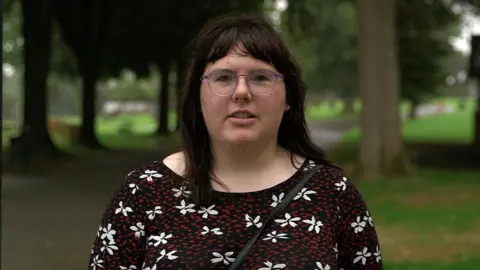Coronavirus: Students 'selling clothes to pay rent'
Some students have been selling their clothes to pay rent after plans to work fell through due to the pandemic.
It comes as two Welsh universities said they had seen a large increase in students applying for hardship grants since April - designed to help those in financial difficulty.
University support services said many students had reported that either they or their parents had lost their jobs.
Rowan Maddock, 19, said she was "struggling" to make ends meet.
Speaking from the garden of her new student house in Cardiff, Rowan said she is already concerned she cannot afford to live there.
Despite applying for about 60 jobs in Cardiff and her home town of Swindon to help supplement her student loan and pay living costs, Rowan said many companies had not even replied.
"Everyone talks about being a 'broke student'," she said.
"So I was expecting there to be times where things would be tight, but I wasn't expecting to be put in a position where I physically can't make ends meet."

Rowan, who is going into the second year of her English Literature and Creative Writing course at Cardiff University, said she had been selling her own clothes and technology on apps and online.
"I didn't think that I'd ever have to sell belongings that I actually like and don't want to get rid of but I'm having to make ends meet."
Rowan said she has made £50 to put towards £400 of rent and bills due next month, but is hopeful of making more on social media if she can become an "influencer" - where brands pay for advertising on accounts which typically have a large following.
"I've also got an Instagram account that I'm trying to build up my followers on.
"I thought that would be a way to get money from companies to promote stuff.
"I've seen a lot of people doing that recently so I know it does work. I thought it would be a good way to get some income that isn't an orthodox way of getting a job."
Rowan said she had spotted many other students about the same age as her trying similar tactics on the social media app.
After her father was put at risk of redundancy, Rowan felt unable to ask her parents to help.
"If, say, my dad does get made redundant then I will have to start looking into options where I have to pay everything entirely by myself, and I can't rely on someone for that, so probably the answer will be a credit card and having to pay back interest on it."
Lack of jobs 'a big concern' for students
Swansea University said it had seen an average increase of 190% in applications for its hardship fund while Cardiff Metropolitan said it had seen a 125% increase.
Figures from the Office of National Statistics showed popular student industries such as retail and hospitality were among some of the worst affected by lockdown, with a 65-90% drop in job opportunities compared to the previous quarter.
And a recent NUS survey suggested almost half of students in Wales who worked alongside their studies had seen a loss of income as a result of coronavirus.
NUS Wales President Becky Ricketts said: "A lot of students are now weighing up do they go to university or not based on their finances.
"They could fall behind on rent payments, they could fall behind on bills, car payments, even travelling to university or being able to get food or a hot meal in a canteen.
"We hear about the phrase 'heating versus eating' and for some students that is absolutely how they live week to week."

Places such as Bangor and Aberystwyth, where students made up the bulk of the population, face a catch-22 situation if students were no longer able to support themselves, Ms Ricketts said.
"A lot of students bolster the hospitality and the retail sector, if those students then aren't coming through to universities then there is the question of how do those sectors survive without the student input."
Natalie Earley, 24, a journalism student at the University of South Wales, said she could no longer get any hours at either of the two hospitality jobs in which she had worked before lockdown.
'I don't have any work'
"I haven't been able to do the jobs I had because they're events-based and there's obviously no events at the moment," she said.
"For the next academic year, for the first term, it's looking quite likely that I'm going to have to go back home to Manchester to my parents and do it remotely because I don't have any work going on.
"I'll try to get another job but at the moment it's looking quite unlikely."
Dana Coaley, 21, who is studying to be a teacher at Aberystwyth University, said she had been relying on working at a children's summer camp in Shropshire, where she was employed last year.
"It wasn't until I went on their website that I found the company was closed down for the summer because of coronavirus," she said.
"I've probably lost out on over £1,000. It's quite a significant weight on me because now I have to rely on people like my parents or my partner.
"If it wasn't for those people I don't even think I would have had a place to live or food or anything.
"People don't realise, they view students as people who go out partying and waste their money. Most of my friends at university never went out a single night because of the financial struggles and that was before lockdown."
